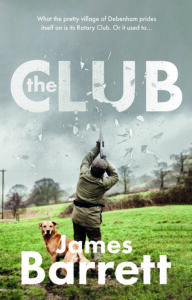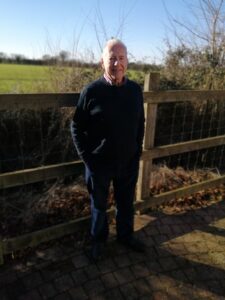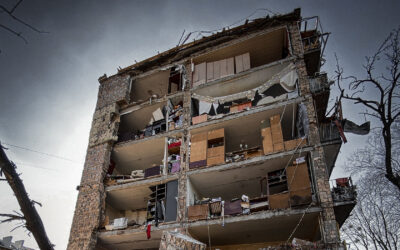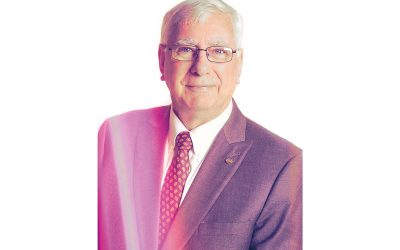Rotary Magazine editor, Dave King, sat down with James to find out more about his experiences and the inspiration behind the novel.
Listen to this article
Tell me about your Rotary story
The first thing I would say is that Rotary is a fantastic organisation and I am proud to be a small part of it.
My wife, Gillian, and I moved to Suffolk in 2007, not long after I retired. A couple of days later, friends Alan and Denise walked up the garden. We sat in the kitchen and chatted for a long time. Everything was in disarray, and we couldn’t even find the kettle to proffer a cup of tea.
Alan invited me to a meeting of the Rotary Club of High Suffolk, which I attended and eventually I joined. Sometime after, I helped to found the Framlingham Rotary Club, where I was the club’s first secretary and also served a term as president. Eventually, I returned to High Suffolk, but the club was struggling and finally dissolved. I then joined my present club, Diss & District, just over the county boundary in Norfolk.
Have you written much in the past which has been published?
No, apart from a letter in The Times. When I retired, I started a writing course, but I soon realised that I really wasn’t interested in writing articles for magazines that I never read; it would have to be a book or nothing.
What sparked the notion of writing a book?
I had long nurtured the ambition to write a book; lots of people do, but most never get around to it. Had it not been for lockdown, neither would I. A blank sheet of paper or PC screen can be daunting.
Can you give a summary about the novel and the central character, George?
The plot
Essentially, this is a whimsical story about a battle for the soul of the club between the incoming president and his supporters who strive for change, and the traditionalists, like George, who want things to stay the same; but darker forces come into play. Other strands of storyline bring together the disparate worlds of Rotary, a local charity, a local shoot and a village hall committee.


‘The Club’ was published earlier this year by Troubador Publishing.
For very different reasons, both factions within the club want George to stand for president-elect, but he refuses because he has already served as president. In an imaginative and audacious move, Machiavellian club secretary, Claire, carefully orchestrates George’s election, without his knowledge. He finds out much later from club minutes, when it’s too late to back out.
The villain of the book, Alec Barton, an old school friend of George’s, is elected a member of the club despite fierce opposition from Fiona, a decision that would have disastrous ramifications within the club.
In a matter to do with the charity of which he is chairman, George is involved in a bizarre and hilarious escapade, which attracts the attention of national newspapers. George has to defend himself in both his club and his charity.
Misfortunes lead to George becoming acting president, and matters come to a head when the club suspends George’s erstwhile friend, turned nemesis, Alec Barton, who had failed to disclose a pecuniary interest in a matter before the club. The club council wrestle with a dilemma: is a conflict of interest a moral absolute, or a matter of degree? The club suspend Alec Barton, who goes on a drunken rampage and comes after George toting a shotgun, with calamitous results. The club is now at a low ebb and faces dissolution. Can it survive?
George, the main protagonist
George is a member of the fictional Rotary Club of Debenham in rural Suffolk. He is autistic, blunt to the point of rudeness and unable to understand body language; he’s not a typical Rotarian.
Despite his autism, he is highly intelligent, well-educated and successful in life. He has a fondness for Gilbert & Sullivan operettas, which provide sanctuary from a noisy and chaotic world. He is also the chairman of a small, local charity of little relevance in the modern world.
Would you say Debenham Rotary Club is typical of Rotary clubs in Great Britain & Ireland?
Rotary clubs are all different in some measure. At least, that what Rotarians who’ve visited more clubs than I have, usually say. Debenham Rotary Club, which is purely a figment of my imagination, is probably much like many small clubs in rural areas, apart from the drama.
Why Rotary as a theme for the book?
It was Mark Twain who said ‘write what you know’. Heeding that advice, I decided to write a story set in a fictional Rotary club. I had been a Rotarian for a number of years and it was a subject with which I felt comfortable. Also, as far as I know, no one else has ever written a novel
about Rotary.
Can you pinpoint some of the idiosyncrasies about Rotary which mark this book?
I suppose new members are more likely to recognise Rotary’s idiosyncrasies. I recall how I was impressed by the power of the Rotary bell, a good solid strike of which brought instant silence to enable the president to address the meeting without competing with the general hubbub of the room. Many clubs have dispensed with the Rotary bell and in The Club, this leads to calamity.
The practice of a visiting member bringing greetings from his or her president is something to which, in The Club, Fiona makes some withering comments.
The villain of the book, Alec Barton, an old school friend of George’s, is elected a member of the club despite fierce opposition from Fiona, a decision that would have disastrous ramifications within the club.”
The Rotary Constitution is prescriptive in such matters as the election of new members, the membership of club council and the election of president-elect, but clubs do not always follow them in every respect. In The Club, I have followed the procedures in detail to create particular storylines
Rotarians often grumble about their dinners but tend to put up with them. In The Club, I have given them good dinners. It’s easier in a book than in real life.
Who are the characters based on and how true is the story?
The characters are all fictional, but that said, they are perhaps a mashup of people I have come across in life, with the exception of George, the main protagonist.


James is currently a member of the Rotary Club of Diss & District in Norfolk.
When I looked critically at the first draft of my manuscript, George, the main character, seemed too bland, and I thought long and hard about the changes that I knew I needed to make.
I had read about a real person who was autistic and had achieved a senior position in his profession, then I came across a book by Sara Gibbs, who is autistic, entitled Drama Queen: One Autistic Woman and a Life of Unhelpful Labels. That provided me with the makings of a character who was ‘different,’ but believable. I gave George an interest in the music of Gilbert & Sullivan and he seemed complete. The Club is a work of fiction, of course.
What did you do in terms of research?
The story takes place roughly over one Rotary year, although it doesn’t unfold chronologically. I have been secretary in two clubs, so I have a fairly good knowledge of the Rotary Constitution, which I consulted from time to time.
I carried out some research into autism to make my main character believable and I also researched the works of Gilbert & Sullivan, as I am not so knowledgeable about their music as is George.
There are many pheasant shoots in Suffolk, and a local shoot and a shotgun incident feature in The Club. I did some research on shotguns and drew on my own experience of a local shoot.
How do you think Rotary will be perceived by readers of your book?
Most people have a positive view of Rotary, even if some think that all we do is eat dinners. I hope that readers who are not Rotarians will end up with a better understanding of Rotary as a force for good. I’m sure they will recognise that the bitter disputes in the book and a dramatic shooting are not how we normally conduct ourselves.
Do you have plans for a follow-up?
I cannot think beyond The Club at the moment. I hope that it achieves some modest success, but I am very aware that the world of books is a crowded market. The Club ends on a point which would lead naturally to another book. Whether I will write that book I cannot say at the moment.


























































